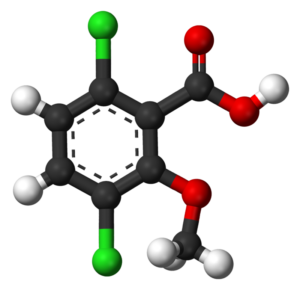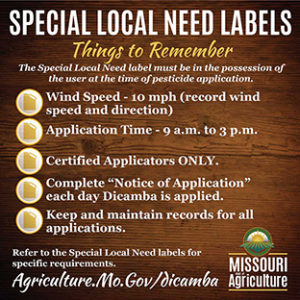by Mae Riordan, MCE Water and Agricultural Communications Intern
and Alicia Claire Lloyd, MCE Clean Water Policy Coordinator
Farms across the Corn Belt are suffering major crop losses due to pesticide drift from a potent herbicide called Dicamba (see EPA fact sheet here), and Missouri is no exception. Dicamba is a pesticide used to control broadleaf plants, and is applied to Dicamba-tolerant seeds, and they must be used together. Monsanto sells both the Dicamba-tolerant seed and the pesticide, so farmers must buy both from the company, allowing Monsanto to dominate the market. It can drift through wind (airborne) to non-tolerant seeds on different farms and can be incredibly destructive to these crops.
Over 161 Missouri farmers have reported complaints related to Dicamba-drift this year.

In response to the numerous complaints, Missouri Department of Agriculture banned the sale and use of Dicamba temporarily on July 7th, joining our neighboring state of Arkansas which banned it earlier in the month. Among others, the Missouri Farm Bureau supported the decision. The ban was lifted last week, on July 17th, after new regulations were put in place to minimize the risk of drift. These regulations will be in effect until December of 2017, so they will last throughout the rest of the growing season. Farmers who want to use Dicamba must apply the pesticide between 9:00am-3:00pm, not apply if wind speeds are greater than 10 mph, must be using a certified applicator, and must fill out a “Dicamba notice of Application Form.” The form is on Missouri Department of Agriculture’s website, and must be filled out 24 hours prior to application. [2]

Monsanto, Dicamba’s producer, has responded to the complaints of Dicamba misuse in various statements since Arkansas announced a ban earlier this month. The company referred to Arkansas’s ban as “premature,” stating, “We sympathize with any farmers experiencing crop injury, but the decision to ban dicamba in Arkansas was premature since the causes of any crop injury have not been fully investigated.” [3] Monsanto suggested that further investigation could reveal a different cause of injury to plants, rather than their pesticide, and their chief technology officer stated, “There is clear symptomatology (of damage) in Arkansas, Tennessee, and Missouri,” says Fraley. “I understand why those farmers are frustrated and looking at answers. Leaf cupping is caused by variety of actors, (such as) weather, disease, certain environments, and a variety of crop protection products like dicamba. Misdiagnosis can be a problem.” [4] Monsanto clearly expressed that there is not enough evidence to support that their product is responsible for the damage to crops, though the hundreds of complaints about Dicamba might show otherwise.
On July 13th, Monsanto updated their previous statement, supporting Missouri’s Department of Agriculture’s decision to add further regulations, stating, “ We commend the Department for its efforts to find solutions that will enable growers to have access to critical technology and do not object to the Department’s application to the U.S. Environmental Protection Agency under Section 24(c) to temporarily impose enhanced applicator training and record keeping.” [5]
Farmers have given insight into how and why issues with Dicamba have escalated. Prior to new regulations and penalties, the fine for illegally spraying Dicamba was relatively low and many felt paying a fine was worth the benefits of the pesticide. One farmer, Douglas Masters, told NPR that he sprayed Dicamba illegally because of the benefits on his crops, “Why’d I do it? Because I’ve got weeds you can’t kill otherwise. But anyway, I paid the fine – and supposed to be done with, I hope.” [2].
This years difficulties come in the midst of new, increased penalties for Dicamba violations. Now, a single violation of Dicamba misuse will result in a $10,000 fine, and repeat offenders can be charged up to $25,000. The increased fines aim to discourage farmers economically from illegally spraying the pesticide. Governor Grietens signed this into law, and stated, “You know, we have guys who are out there doing the right thing every day, trying to support themselves, support their families, serve their community, and they deserve a government that’s going to have their back.” [7]
Certainly, it is crucial for the government to support farmers, especially those who have reported acres of damage from Dicamba-drift and those who follow regulations surrounding pesticide use. It will be interesting to see how the new regulations and fines Missouri has put in place will impact the situation, though many farmers have already dealt with major losses this year. Monsanto should also consider whether their products cause more harm than good, as Dicamba has caused an uncanny amount of damage to crops and farmers.
______________________________________________________________________
[1] Missouri Department of Agriculture. http://agriculture.mo.gov/plants/pesticides/dicamba-facts.php
[2] NPR. http://www.npr.org/2017/06/14/532879755/a-pesticide-a-pigweed-and-a-farmers-murder
[3] Missouri Department of Agriculture. http://agriculture.mo.gov/plants/pdf/dicamba-engenia.pdf
[4] Monsanto. https://monsanto.com/spotlight/articles/monsantos-statement-arkansas-dicamba-ban/
[5] Successful Farming. http://www.agriculture.com/crops/soybeans/monsanto-says-dicamba-movement-largely-due-to-illegal-products-sprayer-contamination
[6] Monsanto. https://monsanto.com/company/media/statements/dicamba-statements/
[7] Missouri Net. http://www.missourinet.com/2017/03/31/gov-greitens-signs-dicamba-legislation-with-increased-penalties-audio/
